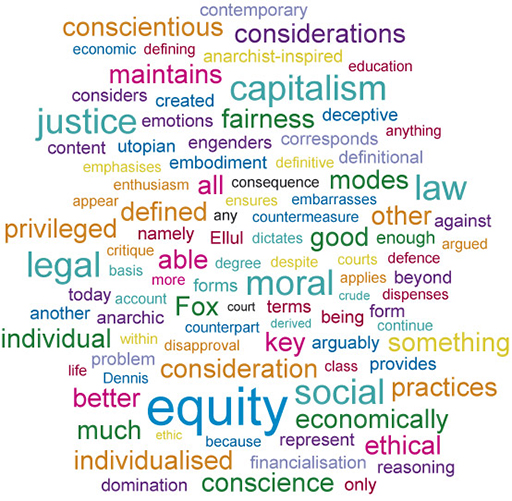3.3.2 Utopians and anarchists
Other than forms of equity tailored for the needs of laissez-faire capitalism there remain ‘utopian’ counterparts, which focus instead on forms of equity that recall Gary Watt’s idea of something with the ‘power to provide an ethic for imagining better law and better life’ (2012, p. 1). Equity understood as something good relates to the long-held association that it has with certain modes of being that in themselves aim for good or virtuous ideas and ways of living – that is, modes of being based on moral and ethical considerations. This challenges narrow doctrinal and somewhat amoral views of equity, especially in terms of countering opportunism, because, as Smith maintains, ‘the notions of right and fairness are not totally free-form – they are supposed to be cabined – but equity is by necessity open-textured, receiving much of its substance from everyday moral disapproval of deceptive behavior’ (2012, p. 29).
Dennis Fox considers equity in much the same way, and believes that equity on these terms is able not simply to act as a critique of capitalism, but also to inform a whole anarchic jurisprudence that aims for alternative ways of organising society. ‘If equity stands for values such as individual and social justice, brotherhood, individualized consideration, flexibility, and reasonable accommodation to others’ misfortune’, says Fox, ‘then perhaps equity is the principle upon which to hang an anarchist-inspired rejection of legal domination’ (1993, p. 104). What Fox favours in equity is, however, precisely that which makes it appear out of place in, or a ‘burden’ to, legal systems underscored by capitalism. Equity on these terms is referred to pejoratively as ‘utopian’ because it engenders and takes seriously law’s impact on a wider variety of definitely human aspects: emotions, beliefs, practices and instincts. In short, equity on this account is an embodiment of conscientious social practices that often provides an inconvenient reminder of the importance that moral and ethical considerations have for legal reasoning.
A good example of how this ‘inconvenience’ plays out is in equity’s continuing relation to conscience. And much like the problem of still legitimately associating fairness and justice as broad social virtues with the law of equity in the context of capitalism, viewing conscience as anything other than a platitude arguably no longer holds. That is, conscience can no longer be understood in terms of an equitable means or defence mechanism for the powerless against the powerful, and as a mode of selfless moral consideration that emphasises acting in common together rather than for individual gain (De Silva, 2000, p. 10); nor as a true countermeasure against opportunism. This is because the type of conscience invoked in equity today is, as Margaret Halliwell maintains, preserved only ‘within the confines of technical learning’ in an ‘artificially ordered’ state (2004, p. 158).
There is a further way to consider conscience in this context: that individualised justice derived from an observance of one’s conscience also corresponds with the individualising basis of capitalism – in spite of Fox’s enthusiasm for that part of equity that provides individual justice alongside social justice. That might seem a crude mapping of one account of individualism atop another, but it is arguably realistic and accords with the type of egocentric human behaviour highlighted by the likes of Marcuse as a feature of modern capitalist societies, of which a type is opportunism. Moreover, factors such as wealth, as a key variable that dictates who is able to access courts and legal services, ensures that conscience is increasingly defined only in accordance with a narrow social class – namely, that of the economically privileged few. As such, conscience as it applies to equity is becoming more homogenised, impoverished and impotent under capitalism.
Activity 3 Word cloud
Construct a word cloud relating to the themes: equity and capitalism. Word clouds are a useful visual tool for creating, sharing and discussing subjects and themes.
In order to do this you will need to write a summary of no more than 200 words based on the material that you have just read, or simply try to build a list of all the terms and definitions that you believe inform your understanding of a relationship between equity and capitalism.
Once you have written a summary or compiled a list you can simply cut and paste the text into a word cloud creator:
You might find it helpful to first cut and paste some of the text from the Annual Mansion House speech by the Chancellor of the Exchequer (Osborne, 2015) into one of the word cloud creators to see what happens with the piece of text and which words are emphasised in the word cloud.
Discussion
Once you have completed the activity you ought to have a word cloud that looks something like the one below:

